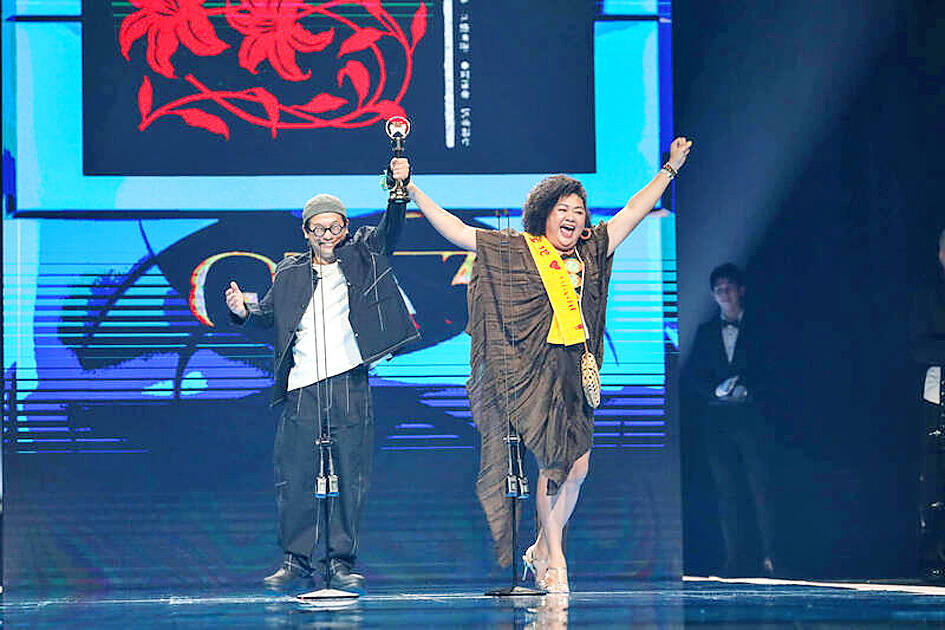Taiwanese singer and activist Panai Kusui on Saturday said that China’s censorship of her remarks about the Tiananmen Square Massacre at the Golden Melody Awards underscores the importance of Taiwan’s freedom.
Beijing’s “actions further underscore the precious freedom in Taiwan,” Panai’s agent quoted the singer as saying after the ceremony.
“The value of freedom can be felt at this moment,” Panai said. “I hope everyone will cherish what we have.”

Photo courtesy of the Taiwan Television Enterprise
The indigenous singer won Best Taiwanese Album at the nation’s most prestigious music awards for Ia-Po (夜婆).
During her acceptance speech, she urged people not to forget China’s 1989 crackdown on democracy protesters in Beijing, in which hundreds and perhaps more than 1,000 people were killed.
Noting that the awards were celebrating their 35th anniversary this year, Panai said that this year “also marked the 35th anniversary of the Tiananmen Square incident. Let’s not forget.”
Her remarks, works and discussions about her were removed from the Internet in China shortly after the event.
President William Lai (賴清德), referencing Panai’s comments, praised the freedom artists have in Taiwan.
“Music is life, and music is also unfettered freedom. We will continue to protect and defend the freedom of all musicians to create,” he wrote on Facebook.
Minister of Culture Lee Yuan (李遠) thanked Panai on Facebook for showing confidence and demonstrating freedom through her music.
No Chinese singers attended this year’s awards, despite several high-profile nominations, including Xu Jun (許鈞) winning Best Composer.
Another Chinese singer, Jude Chiu (裘德), traveled to Taiwan, but returned to China before the awards, citing health reasons.
Taiwanese indie rock band No Party For Cao Dong (草東沒有派對) emerged as the biggest winner of this year’s awards, winning some of the night’s top prizes, including Album of the Year, Best Mandarin Album and Best Band for their sophomore album The Clod (瓦合).
The quartet took the nation’s music scene by storm in 2017 when they won Best New Artist, Best Band and Song of the Year.
Other major winners included MC HotDog (姚中仁), who took home Best Male Mandarin Singer for his album Disgusted Artist (髒藝術家), and Shi Shi (孫盛希), who was named Best Female Mandarin Singer for her album Boomerang.
Justin Su (蘇明淵) clinched Best Male Taiwanese Singer for his album Empty Side of the Heart (心內烏空), while Huang Fei (黃妃) won her third Best Female Taiwanese Singer award, this time for her album Eighteen Martial Arts (十八般武藝).
Chiu Shu-chan’s (邱淑蟬) Shape of Life (繭的形狀) won Best Hakka Album, while Zoomie (陳彥竹) took home Best Hakka Singer for her album Zhin Moi (鎮妹).
Usay Kawlu was named Best Indigenous Language Singer for her album Harateng no Pangcah (The Beauty of Pangcah) (美感).
Makav, a member of the Bunun community, won Best New Artist for her album Treasure (寶藏), which also won Best Indigenous Language Album.
Taiwanese indie rock band Accusefive (告五人) took home Song of the Year for We Will Be Fine (又到天黑) off last year’s album of the same name.
Additional reporting by Reuters

The Central Election Commission has amended election and recall regulations to require elected office candidates to provide proof that they have no Chinese citizenship, a Cabinet report said. The commission on Oct. 29 last year revised the Measures for the Permission of Family-based Residence, Long-term Residence and Settlement of People from the Mainland Area in the Taiwan Area (大陸地區人民在台灣地區依親居留長期居留或定居許可辦法), the Executive Yuan said in a report it submitted to the legislature for review. The revision requires Chinese citizens applying for permanent residency to submit notarial documents showing that they have lost their Chinese household record and have renounced — or have never

A magnitude 5.6 earthquake struck off the coast of Yilan County at 12:37pm today, with clear shaking felt across much of northern Taiwan. There were no immediate reports of damage. The epicenter of the quake was 16.9km east-southeast of Yilan County Hall offshore at a depth of 66.8km, Central Weather Administration (CWA) data showed. The maximum intensity registered at a 4 in Yilan County’s Nanao Township (南澳) on Taiwan’s seven-tier scale. Other parts of Yilan, as well as certain areas of Hualien County, Taipei, New Taipei City, Taoyuan, Hsinchu County, Taichung and Miaoli County, recorded intensities of 3. Residents of Yilan County and Taipei received

Taiwan has secured another breakthrough in fruit exports, with jujubes, dragon fruit and lychees approved for shipment to the EU, the Ministry of Agriculture said yesterday. The Animal and Plant Health Inspection Agency on Thursday received formal notification of the approval from the EU, the ministry said, adding that the decision was expected to expand Taiwanese fruit producers’ access to high-end European markets. Taiwan exported 126 tonnes of lychees last year, valued at US$1.48 million, with Japan accounting for 102 tonnes. Other export destinations included New Zealand, Hong Kong, the US and Australia, ministry data showed. Jujube exports totaled 103 tonnes, valued at

BIG SPENDERS: Foreign investors bought the most Taiwan equities since 2005, signaling confidence that an AI boom would continue to benefit chipmakers Taiwan Semiconductor Manufacturing Co’s (TSMC, 台積電) market capitalization swelled to US$2 trillion for the first time following a 4.25 percent rally in its American depositary receipts (ADR) overnight, putting the world’s biggest contract chipmaker sixth on the list of the world’s biggest companies by market capitalization, just behind Amazon.com Inc. The site CompaniesMarketcap.com ranked TSMC ahead of Saudi Aramco and Meta Platforms Inc. The Taiwanese company’s ADRs on Tuesday surged to US$385.75 on the New York Stock Exchange, as strong demand for artificial intelligence (AI) applications led to chip supply constraints and boost revenue growth to record-breaking levels. Each TSMC ADR represents